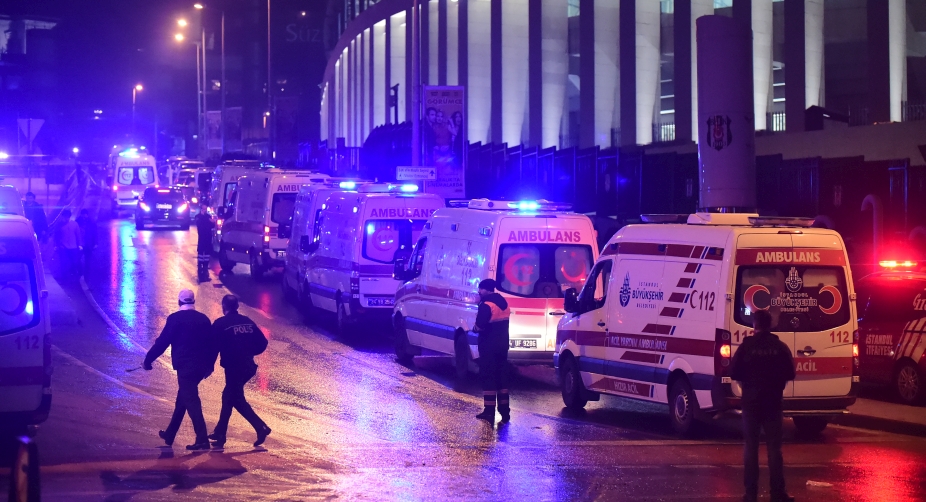The heinous bloodbath at a swanky nightclub on the banks of the Bosphorus in Istanbul brought what had already been a terrible year for Turkey to an exceptionally brutal conclusion.
It was a year peppered with terrorist attacks, but its centrepiece was arguably a coup attempt in July that apparently came close to succeeding, followed by a sweeping wave of state repression that has deepened fractures in Turkish society amid shifting allegiances on the Syrian front that have resulted in a Nato stalwart effectively allying itself with Russia.
Advertisement
If the idea behind the assassination a fortnight ago of the Russian ambassador to Turkey was to precipitate a stand-off between Moscow and Ankara, it has predictably failed. The assassin, an off-duty policeman, was killed immediately afterwards, so his precise motivations may never be known, but his “Remember Aleppo!” slogan while performing his dastardly act offers obvious pointers.
Syria’s largest city was recently wrested from rebel control by forces allied to the government of Bashar al-Assad, with the Russians and Iranians instrumental in producing this result. It has been claimed that Turkey’s president Recep Tayyip Erdogan helped out by persuading his Islamist allies among the Syrian rebels to facilitate the evacuation of eastern Aleppo.
The Erdogan government was involved in the Syrian conflict long before its troops directly stepped in, and its assistance to Islamist factions included turning a blind eye to international recruits — many of them attracted by the militant Islamic State group — entering the war-torn country through the Turkish border. ISIS turned against Turkey once this route became a lot more restricted, and after Ankara had second thoughts about its initial refusal to permit American and other Nato forces to use Turkish bases as a launching pad for airstrikes against IS on Syrian territory.
Turkey’s relations with the US have frayed markedly since the abortive coup in July, partly over Washington’s refusal to extradite Fethullah Gulen, who is accused of having masterminded the attempt to overthrow his former ally Erdogan. Whether the advent of the Trump administration will improve relations remains to be seen.
Meanwhile, Turkey had visibly bristled at Russia’s intervention in Syria on behalf of Assad, and things came to a head after its forces shot down a Russian warplane that had allegedly strayed into Turkish airspace. Vladimir Putin resisted any temptation he may have had to ramp up the confrontation, instead using the incident as a lever to forge an unlikely informal alliance that had the twin advantage of facilitating his aims in Syria while driving a wedge between leading Nato members.
It was thus Russia and Turkey, alongside Iran, that jointly announced a truce in Syria shortly before the Istanbul atrocity, and successfully sought the imprimatur of the UN. The cessation of hostilities does not include ISIS, and is anyhow not expected to last very long, but it apparently does cover Al Nusra, an organisation once formally allied with Al Qaeda that has played a key role in the rebellion against Assad and enjoyed Turkish favours in the bargain, but is also likely to have borne the brunt of Russian bombing campaigns.
By some accounts, the primary purpose of Erdogan’s Syrian adventure has always been to forestall the likelihood of a de facto Kurdish state on Turkey’s border, and he strove hard to prevent Turkish Kurds from aiding their Syrian comrades. A ceasefire between the Turkish state and the Kurdistan Workers’ Party (PKK) broke down in 2015, and the latter claimed responsibility for some of last year’s terrorist attacks, directed chiefly against security forces — the PKK claims not to target civilians and roundly condemned the Reina nightclub massacre.
The Americans have heeded some of Erdogan’s concerns while broadly backing the Kurdish People’s Protection Units (YPG) in their fight against ISIS (and potentially Assad). But then the US strategy in Syria has anyhow been all over the place, and last month’s truce announcement conspicuously excluded Washington, demonstrating the extent to which it has been sidelined.
Turkey under Erdogan, meanwhile, finds itself besieged on three fronts — by the Gulenists, Kurds and ISIS, which belatedly claimed responsibility for the 39 deaths and dozens of injuries at the Reina nightclub.
The president’s reaction to Turkey’s multiple woes has largely revolved around clamping down on all dissent and extending the breadth and depth of his autocracy, blaming everyone but his own often contradictory policies for all that is going horribly wrong in a nation that not long ago seriously aspired to become a fully fledged European state but has lately been sucked right back into the Middle Eastern cauldron, with its present blighted and its future increasingly uncertain.
Dawn/ANN











